
Hamilton was a wonderful outlet for me during my four years; I tried all sorts of new things, grew personally as well as intellectually, and somewhere along the line stumbled across what I hope to be my future career path. But at the beginning of my senior year, I decided that I wanted to spend several years right out of college helping others before helping myself. Mostly, though, I wasn’t sure what I wanted to do with my Comparative Literature degree; I thought I wanted to go into journalism, but I wasn’t a huge fan of sitting in front of a desk all day. I knew I wanted something that would engage me and allow me to be around people while giving me that warm, fuzzy feeling of helping the world, even if it was just for a year or two.
So I applied to Teach for America, inspired by their multiple information sessions and their fierce advertising campaign on Hamilton’s campus. I sent in the paper applications, had a phone interview, and made it to the final interview round. In preparation for the all-day interview, I had meetings at the Career Center to prepare my sample lesson and, in the end, felt confident on my way to Syracuse to interview. I taught, debated and wrote with 10 other college seniors throughout the exhausting all-day process, feeling satisfied at the end. Unfortunately, I found out about a month later that I was not chosen to be a part of the organization.
Distraught that my idealism was going unrecognized, I looked to other service and education programs. I applied to DC Teaching Fellows, an organization similar to Teach for America but designed to help diverse individuals (not only recent college graduates) become career teachers, which was more than TFA’s two-year commitment. I also made it to the final interview round with DC Teaching Fellows, and in March I flew to Washington for a similar all-day interview. But my trek was again unrewarded; I was rejected from DC Teaching Fellows as well.
At this point I was disillusioned with trying to do good. How can anyone help the world when they are so preoccupied with elbowing others for the coveted spots to do so? In a last-ditch effort I applied to City Year, an organization that differs from the others in several ways. First, the age restriction is for people from 17-24, which meant that I would be working alongside recent high school graduates. Another big difference is that City Year corps members are not in charge of their own classrooms; rather, they are placed on teams in schools all around the city to act as “tutors, mentors and role models” for students and to assist teachers in the classroom. City Year also differs from other similar organizations because, in the course of one week, a corps member could spend four days per week in school, then the last day doing a transformative service project (like painting a mural or planting a garden) or working on leadership development. It was this connection to education as well as the variation in activities during the week that made City Year a good option for me. After two phone interviews and placement on the waitlist for several months, I finally heard a month after graduating that I had been accepted to the 2010-2011 corps in Washington, D.C.
In spite of so many rejections, I feel that the process I went through to arrive at City Year made it worth it. City Year has provided a very enriching experience for me—exactly the kind I was looking for right after college. I find myself deeply connected to my teammates and to the 20 students in my third grade classroom in southeast D.C., and I love waking up every morning to celebrate their triumphs and to help them through their challenges. The moral of my story is to not let your idealism be vanquished by rejections from what you think is your dream organization; you can do good in other outlets than those you see at first glance.
